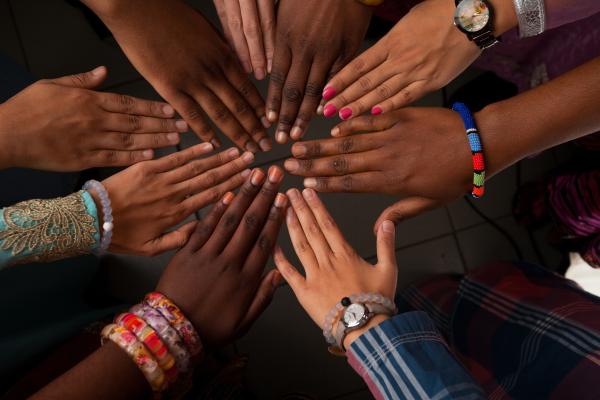Flora Davies
Flora is a Technical Analyst for the Gender-Based Violence (GBV) portfolio, with experience in research, technical assistance, policy analysis and multi-stakeholder engagement.
 Our global Gender-Based Violence (GBV) team provides strategic technical support to actors across the GBV ecosystem from donors to community-level women-led organisations. We are a multi-disciplinary team delivering programme design and implementation support, advocacy, research reports, MEL and helpdesk services.
Our global Gender-Based Violence (GBV) team provides strategic technical support to actors across the GBV ecosystem from donors to community-level women-led organisations. We are a multi-disciplinary team delivering programme design and implementation support, advocacy, research reports, MEL and helpdesk services.
Our team aspires to apply our feminist principles in all our work and to support sustained and transformative change. We partner with diverse stakeholders and we take an intersectional approach to our work on GBV prevention and response across development and humanitarian contexts.
Our work includes primary prevention programming, community-level response to GBV and SEAH, school-related GBV, GBV in Emergencies, Technology-Facilitated GBV, Violence against LGBTQI+ communities, and GBV in Climate and Economic programming.
Read more about our current work or search our extensive GBV Resource Library below.
Flora is a Technical Analyst for the Gender-Based Violence (GBV) portfolio, with experience in research, technical assistance, policy analysis and multi-stakeholder engagement.
This annual report summarises the activity of the GBV AoR Helpdesk for the year 2024, including the type of queries the Helpdesk has responded to and the regions it has supported.
This learning brief introduces climate and disaster risk reduction (DRR) actors to the importance of addressing the connections between GBV and climate change to facilitate more effective and comprehensive climate action in the Asia-Pacific region. It begins with an overview of evidence of how climate change, manifested through both sudden onset disasters (e.g., cyclones, floods) and slow-onset events (e.g. drought) can lead to increased risks of GBV for women and girls, and how, in turn, this creates barriers to climate resilience.
This annotated bibliography provides short summaries of guidance, tools, research and other types of available materials that can support gender-based violence (GBV) actors to design and implement disability inclusive and participatory programs.
This resource offers practical, experience-based guidance on GEDSI mainstreaming in practice showing how to move from strong analysis to lasting change in policies, systems and programmes.
Women around the world have lived experiences that are different from men, informed by norms that perpetuate gender inequality. This gender inequality in turn underpins multiple forms of violence that women and girls are exposed to across their lives. In humanitarian settings, certain types of violence against women and girls, (VAWG, also referred to as gender-based violence, or GBV) can increase.
[English]
This tipsheet helps health and GBV workers (including volunteers and frontline service providers) to understand the interactions between SRHR and GBV in humanitarian crises. The resource provides information on SRHR and GBV key issues in Niger and the West Africa region, tips on how to approach integration ethically and effectively, and an annotated bibliography of key resources in French and English.
[French]
It is important that both GBV and Protection actors understand when collaboration is appropriate, what should be in place to enable it, and when to advocate for separate programming. This tipsheet provides guidance to actors from both sectors on effective ways of working together that promote evidence-based good practices for survivor support.
Last week, I had the opportunity to spend a deeply engaging and productive week in the field with our incredible Pamodzi Kuthetsa Nkhanza (PKN) the What Works II partners in Malawi.